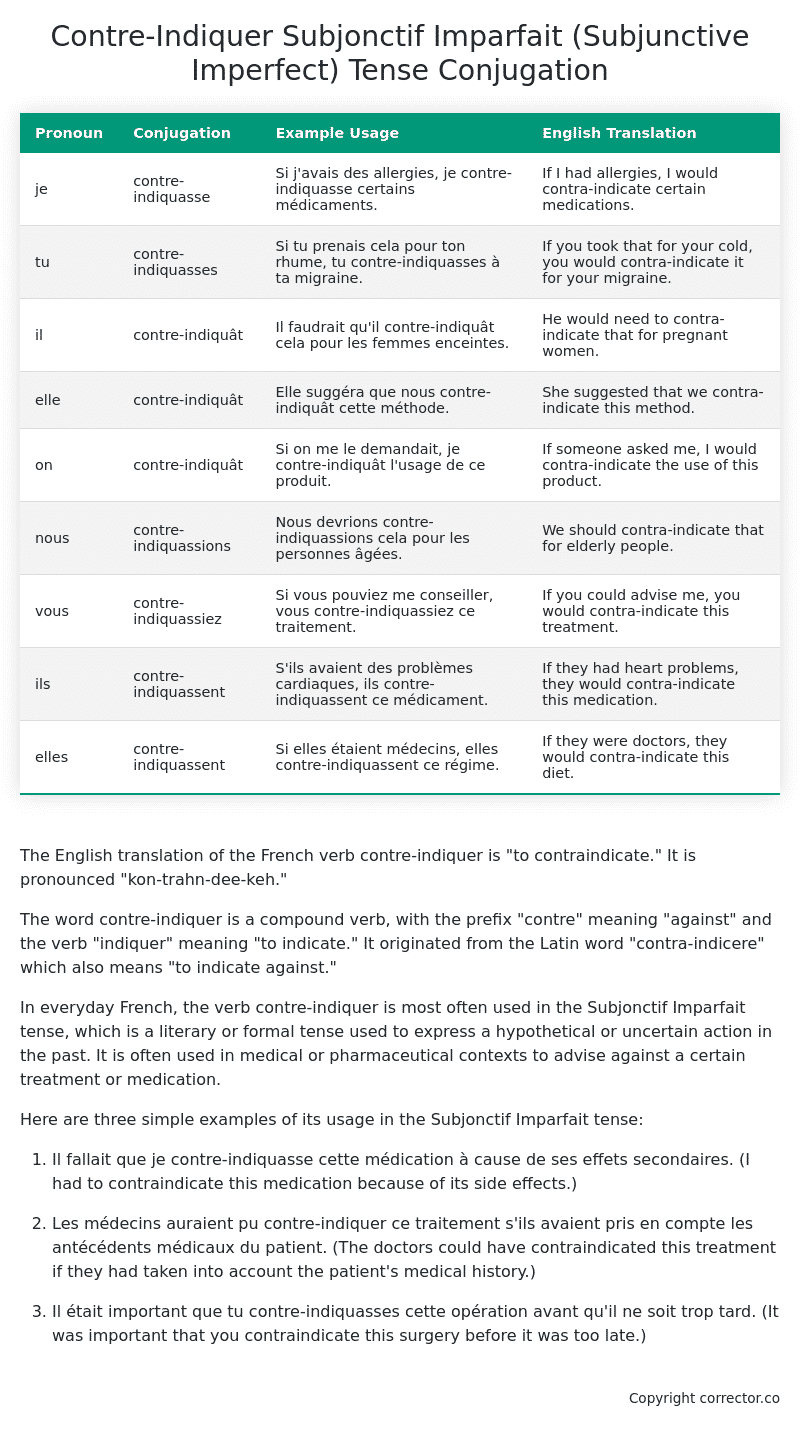Subjonctif Imparfait (Subjunctive Imperfect) Tense Conjugation of the French Verb contre-indiquer
Introduction to the verb contre-indiquer
The English translation of the French verb contre-indiquer is “to contraindicate.” It is pronounced “kon-trahn-dee-keh.”
The word contre-indiquer is a compound verb, with the prefix “contre” meaning “against” and the verb “indiquer” meaning “to indicate.” It originated from the Latin word “contra-indicere” which also means “to indicate against.”
In everyday French, the verb contre-indiquer is most often used in the Subjonctif Imparfait tense, which is a literary or formal tense used to express a hypothetical or uncertain action in the past. It is often used in medical or pharmaceutical contexts to advise against a certain treatment or medication.
Here are three simple examples of its usage in the Subjonctif Imparfait tense:
-
Il fallait que je contre-indiquasse cette médication à cause de ses effets secondaires. (I had to contraindicate this medication because of its side effects.)
-
Les médecins auraient pu contre-indiquer ce traitement s’ils avaient pris en compte les antécédents médicaux du patient. (The doctors could have contraindicated this treatment if they had taken into account the patient’s medical history.)
-
Il était important que tu contre-indiquasses cette opération avant qu’il ne soit trop tard. (It was important that you contraindicate this surgery before it was too late.)
Table of the Subjonctif Imparfait (Subjunctive Imperfect) Tense Conjugation of contre-indiquer
| Pronoun | Conjugation | Example Usage | English Translation |
|---|---|---|---|
| je | contre-indiquasse | Si j’avais des allergies, je contre-indiquasse certains médicaments. | If I had allergies, I would contra-indicate certain medications. |
| tu | contre-indiquasses | Si tu prenais cela pour ton rhume, tu contre-indiquasses à ta migraine. | If you took that for your cold, you would contra-indicate it for your migraine. |
| il | contre-indiquât | Il faudrait qu’il contre-indiquât cela pour les femmes enceintes. | He would need to contra-indicate that for pregnant women. |
| elle | contre-indiquât | Elle suggéra que nous contre-indiquât cette méthode. | She suggested that we contra-indicate this method. |
| on | contre-indiquât | Si on me le demandait, je contre-indiquât l’usage de ce produit. | If someone asked me, I would contra-indicate the use of this product. |
| nous | contre-indiquassions | Nous devrions contre-indiquassions cela pour les personnes âgées. | We should contra-indicate that for elderly people. |
| vous | contre-indiquassiez | Si vous pouviez me conseiller, vous contre-indiquassiez ce traitement. | If you could advise me, you would contra-indicate this treatment. |
| ils | contre-indiquassent | S’ils avaient des problèmes cardiaques, ils contre-indiquassent ce médicament. | If they had heart problems, they would contra-indicate this medication. |
| elles | contre-indiquassent | Si elles étaient médecins, elles contre-indiquassent ce régime. | If they were doctors, they would contra-indicate this diet. |
Other Conjugations for Contre-Indiquer.
Le Present (Present Tense) Conjugation of the French Verb contre-indiquer
Imparfait (Imperfect) Tense Conjugation of the French Verb contre-indiquer
Passé Simple (Simple Past) Tense Conjugation of the French Verb contre-indiquer
Passé Composé (Present Perfect) Tense Conjugation of the French Verb contre-indiquer
Futur Simple (Simple Future) Tense Conjugation of the French Verb contre-indiquer
Futur Proche (Near Future) Tense Conjugation of the French Verb contre-indiquer
Plus-que-parfait (Pluperfect) Tense Conjugation of the French Verb contre-indiquer
Passé Antérieur (Past Anterior) Tense Conjugation of the French Verb contre-indiquer
Futur Antérieur (Future Anterior) Tense Conjugation of the French Verb contre-indiquer
Subjonctif Présent (Subjunctive Present) Tense Conjugation of the French Verb contre-indiquer
Subjonctif Passé (Subjunctive Past) Tense Conjugation of the French Verb contre-indiquer
Subjonctif Imparfait (Subjunctive Imperfect) Tense Conjugation of the French Verb contre-indiquer (this article)
Conditionnel Présent (Conditional Present) Tense Conjugation of the French Verb contre-indiquer
Conditionnel Passé (Conditional Past) Tense Conjugation of the French Verb contre-indiquer
L’impératif Présent (Imperative Present) Tense Conjugation of the French Verb contre-indiquer
L’infinitif Présent (Infinitive Present) Tense Conjugation of the French Verb contre-indiquer
Struggling with French verbs or the language in general? Why not use our free French Grammar Checker – no registration required!
Get a FREE Download Study Sheet of this Conjugation 🔥
Simply right click the image below, click “save image” and get your free reference for the contre-indiquer Subjonctif Imparfait tense conjugation!

Contre-Indiquer – About the French Subjonctif Imparfait (Subjunctive Imperfect) Tense
Formation
Common Everyday Usage Patterns
Interactions with Other Tenses
Subjonctif Présent
Indicatif Passé Composé
Conditional
Conditional Perfect
Summary
I hope you enjoyed this article on the verb contre-indiquer. Still in a learning mood? Check out another TOTALLY random French verb conjugation!


